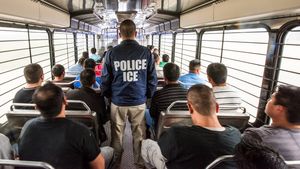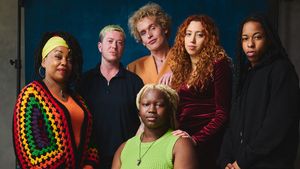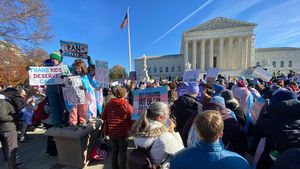Treatment GuideJust DiagnosedSex & DatingAfrican AmericanStigmaAsk the HIV DocPrEP En EspañolNewsVoicesPrint IssueVideoOut 100
CONTACTCAREER OPPORTUNITIESADVERTISE WITH USPRIVACY POLICYPRIVACY PREFERENCESTERMS OF USELEGAL NOTICE
© 2025 Pride Publishing Inc.
All Rights reserved
All Rights reserved
Scroll To Top
By continuing to use our site, you agree to our Privacy Policy and Terms of Use.
After a few moments of perusing status updates and photos of friends on Facebook, an ad caught Michael Banko's eye. The ad sought participants in a study for an HIV/AIDS vaccine. This wasn't Banko first association with HIV awareness, research, and prevention. In 2006, he raised money to run the National AIDS Marathon. But becoming a vaccine volunteer, he decided, was his duty. 'I consider myself a fairly healthy gay male, and I've been lucky as far as the whole HIV/AIDS thing goes,' he says. 'But I knew I could do my part to help others as well.' After Banko threw his hat into the ring he was subject to several rounds of paperwork, blood work, screening, and interviews. Michele Vertucci, the clinic manager at the AIDS Research Alliance in Los Angeles, says that potential participants must first share their medical background and lifestyle habits during a telephone interview. Once advancing past that round, candidates come in to the clinic for a screening appointment, which involves the signing of a thorough consent form. After which, Vertucci or another administrator meets with the candidates individually to outline everything they face during the trial, including the length of the study and the basics of vaccine or treatment trials. Trials for vaccines like Banko's typically lasts 3-5 years, while trials for treatment drugs like Merck's Isentress drug, which the ARA evaluated, last up to two years. In either case, it's a substantial commitment, and research organizations like the ARA want to make sure that participants are dedicated to checking in regularly and staying on top of their health. During the testing phase, volunteers are either given a placebo, or the real drug or vaccine. They're then expected to to report regularly on their health and to be screened for changes in their condition. The ARA's current vaccine study only has 55 enrolled. Vertucci acknowledges that some potential candidates for study don't even consider participating in the AIDS vaccine trials due to the fear that they might contract the virus, or because society's view on HIV has changed. 'Back in 1998, we tested the first [AIDS] vaccine study in the U.S.,' she says. 'At that time, we first screened 400 people, and enrolled 200 into the study. In 1998, there was a shared knowledge among the community that we needed a vaccination. And I think, with this current vaccine study, it's been more difficult in some ways to recruit people than it was in 1998. It's a different atmosphere. Now, it's no longer viewed as a fatal disease. Young people now just don't think they'll get infected, or others have a fatalistic approach.' As for fears about becoming infected via a vaccine, Vertucci says that shouldn't be a concern. 'If we were doing something like a hepatitis B study, people wouldn't have the same fears, or concerns,' Vertucci says. 'The HIV is man-made in a lab, so a person can't get HIV from the vaccine, and you can't give it to a partner. It's not a live virus. Once people hear that, then they're like, 'Oh, O.K., yeah, I can do this.' It's just like when you were a kid and you got a polio vaccination.' Some study participants agree to be in trials for the small compensation. Others take the opportunity to try treatment drugs that have not been released to the market, but could still help counter disease symptoms or treatment side effcts, like diarrhea or lipodystrophy. Testers like Banko do it because he knows it could help pave the way for a world without AIDS. 'My friends who are HIV-positive, seem to be thankful,' he says. 'Even though it won't be helping them, unfortunately, they understand why this is so necessary.'
From our Sponsors
Most Popular
Lexi Love comes out as HIV+ after Trump deletes federal resources
January 23 2025 11:23 AM
Grindr is reminding us why jockstraps are so sexy and iconic
May 02 2025 5:36 PM
BREAKING NEWS: Trump admin moves to end federal HIV prevention programs
March 18 2025 6:10 PM
Trump's orders prompt CDC to erase HIV resources
January 31 2025 5:29 PM
Celebrating Black History Month with our annual African American issue
February 01 2025 3:28 PM
Tyler TerMeer vows to continue to fight for health care for all
January 28 2025 3:00 PM
Discover the power of Wellness in your life
March 26 2025 12:41 PM
Plus: Featured Video
Latest Stories
Dancer. Healer. Survivor. DéShaun Armbrister is all of the above
July 02 2025 8:23 PM
Two right-wing Supreme Court justices signal they may uphold access to PrEP and more
April 21 2025 4:10 PM
Broadway's best raise over $1 million for LGBTQ+ and HIV causes
April 03 2025 7:15 PM
Plus nominated for 2025 GLAAD Media Award
January 22 2025 12:42 PM
'RuPaul's Drag Race' star Trinity K Bonet quietly comes out trans
December 15 2024 6:27 PM
AIDS Memorial Quilt displayed at White House for the first time
December 02 2024 1:21 PM
BREAKING: Supreme Court rules to save free access to preventive care, including PrEP
June 27 2025 10:32 AM
1985: the year the AIDS crisis finally broke through the silence
June 26 2025 11:24 AM
Trump admin guts $258 million in funding for HIV vaccine research
June 03 2025 3:47 PM
500,000 Children at Risk: PEPFAR Funding Crisis
April 08 2025 3:51 PM
The Talk Season 5 premieres this spring with HIV guidance for the newly diagnosed
March 26 2025 1:00 PM
Jess King is here to help you live your happiest, healthiest life yet
March 24 2025 4:35 PM
A camp for HIV-positive kids is for sale. Here's why its founder is celebrating
January 02 2025 12:21 PM
VIDEO: A man living with HIV discusses his journey to fatherhood
June 10 2025 4:58 PM
HRC holds 'die-in' to protest Trump health care cuts
April 28 2025 2:11 PM
Season 4 of The Switch on resilience & radical self-love returns this spring
March 26 2025 12:20 PM
Gerald Garth is keeping people of color happy and healthy through trying times
March 11 2025 3:38 PM
This long-term HIV survivor says testosterone therapy helped save his life.
December 16 2024 8:00 PM
Ricky Martin delivers showstopping performance for 2024 World AIDS Day
December 05 2024 12:08 PM













































































